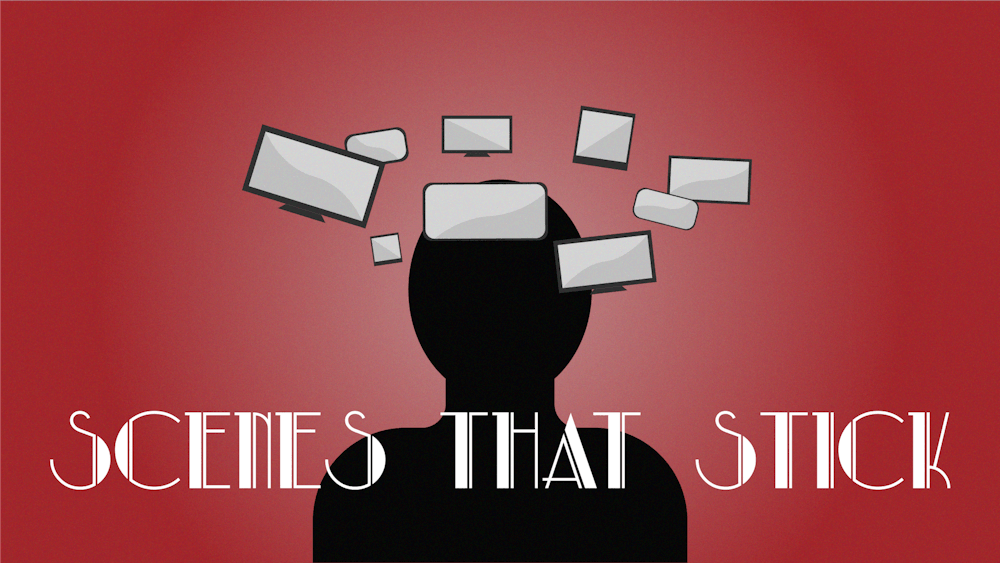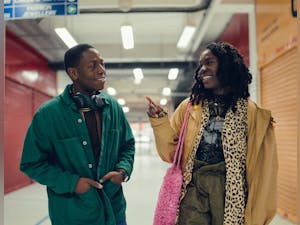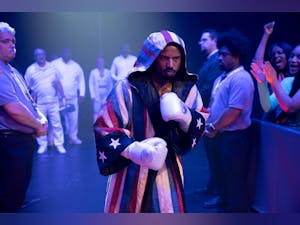From: Silver Screen
Scenes that Stick: ‘Don’t Look Up’ explores the dual nature of a culture that’s chronically online

Adam McKay’s “Don’t Look Up” is anything but a surface level film. Released in 2021, it explores relevant issues such as political polarization and the loss of trust in scientific research. The film mirrors many of today's societal fractures and the performances of its legendary cast make these issues resonate with the audience.
Dr. Randall Mindy (Leonardo DiCaprio) and graduate student Kate Dibiasky (Jennifer Lawrence) discover a comet the size of Mount Everest hurtling toward Earth. The two travel to the White House to inform President Orlean (Meryl Streep) of this life-threatening discovery, only to be met with an extreme lack of concern. Randall and Kate are left to convince a public consumed by media headlines and led astray by corrupt politicians of the gravity of their situation.
The movie comments on tensions between politics, science and the media in its portrayal of the scientists' struggle with President Orlean. Randall and Kate strive to convince Orlean to acknowledge the comet and strategize an appropriate public response. After Kate observes the comet in the sky, the scientists launch a campaign entitled “Just Look Up” to convince the population that their discovery is accurate; Orlean quickly counters with “Don’t Look Up,” a campaign designed to give the populace a false sense of security and downplay Kate’s calls for alarm.
The debate sparks an intense media blitz encapsulated in a fast-paced montage sequence of social media posts, speeches and video clips. The scene contains clips of President Orlean surrounded by followers promoting her cause, a nod to today's populist politicians, that strikes a chord in terms of grappling with today's political polarization. Parts of the montage can be overwhelming, as numbers of comments and likes appear across the screen with posts and videos featuring passionate arguments agreeing with one campaign or the other.
This scene illustrates the power of social media in times of political turmoil and social justice movements. The montage also reflects the overstimulating feeling of social media that is prevalent today in the digital age as notifications constantly flash across our ever-present screens.
The montage sequence inspires a dual message of empowerment and discouragement. While the montage demonstrates the ability of social media to empower people to spread ideas and information, it also highlights how daunting and important the task of reigning in misinformation online is. These mixed feelings echo those that many viewers likely experience in this time of conflicting obligations and difficult choices.
Adding to the film’s poignancy is the writers’ decision to create an obstacle which is intrinsically linked to the public’s trust in scientific information. Not only is this relevant in a society grappling with a global pandemic, but it also implies that there should be more concern about transparency in the media and the influence that stems from powerful political figures.
Regardless of where it stems from, misinformation is a huge issue in today’s social climate. “Don't Look Up” explores the gravity of this topic and its potential to lead to the destruction of a society. Orlean’s campaign shows that she seeks to benefit herself and thrive off of publicity, rather than making a responsible choice to prioritize the safety of the public. The dramatization of the misinformation problem stimulates reflective thought from the audience about their own society’s behavior and presence on social media.
The story encapsulates issues that today's population is wrestling with, explaining why it stirs up such intense emotions. In spite of its often grim reflections on contemporary society, the film employs a healthy dose of dark comedy to get across important messages. The scene explores the polarizing and powerful essence of social media and compels the audience to consider their own experiences.
mzaczkiewicz@theeagleonline.com




